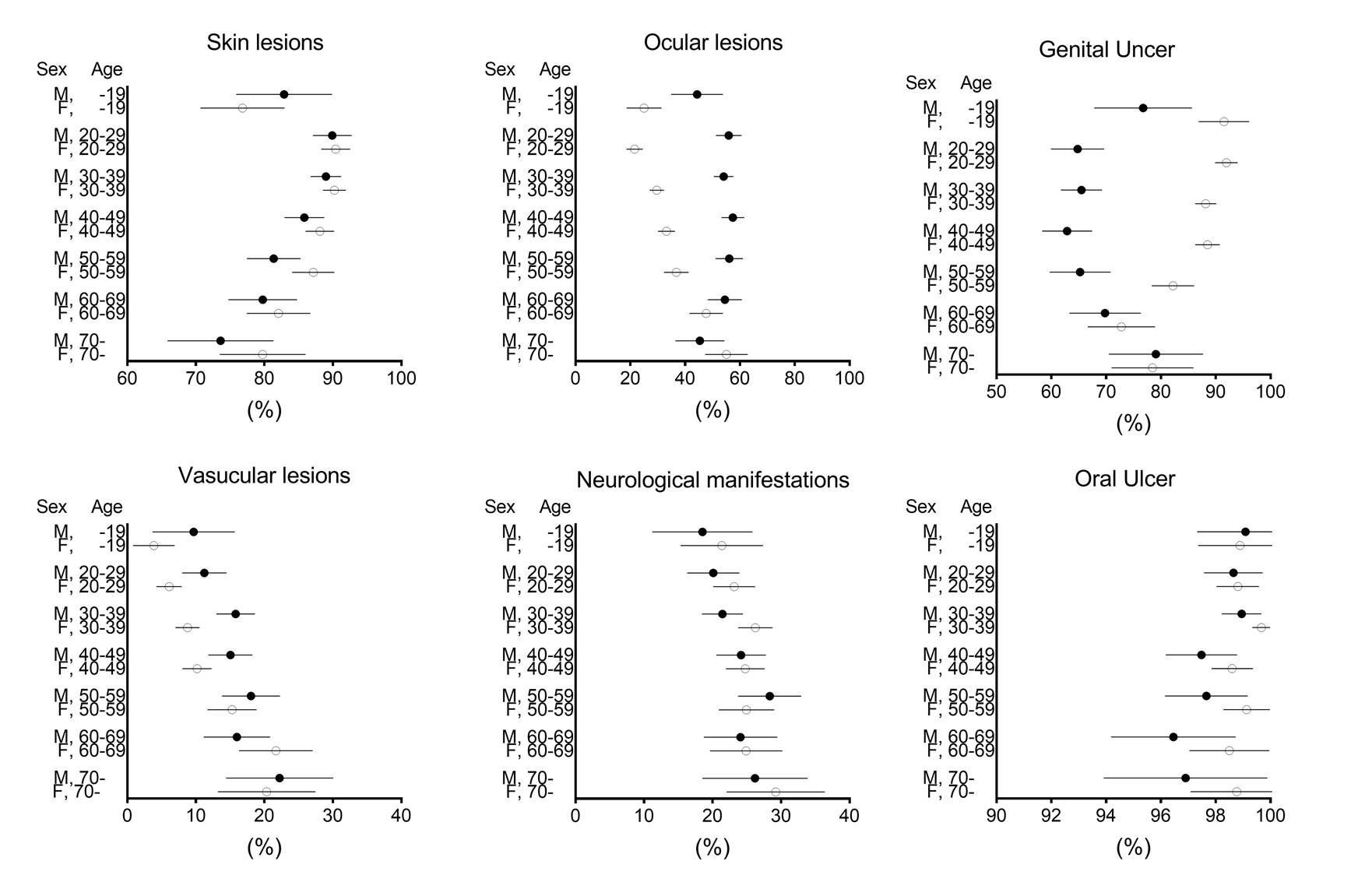Session Information
Session Type: ACR Poster Session B
Session Time: 9:00AM-11:00AM
Background/Purpose: Behçetfs disease (BD) has a broad spectrum of clinical phenotypes. Sex differences in BD presentation has been one of the major topics of BD epidemiology. The prevalence of BD was found not to be very different between men and women, whereas that of each symptom showed a clear difference between the sexes. However, it is important to consider age factor in discussing sex differences, because the differences are mainly caused by sex hormone environments in the reproductive age besides sex chromosome gene products. In principle, genetic factors contribute to disease phenotype more prominently in young aged onset patients than elderly ones in any diseases. On contrary, elderly individuals are more exposed environmental factors and the effects are accumulated. Unfortunately, age differences in BD was reported in few studies with smaller numbers of cases.
Methods: The database of newly registered BD was obtained from the Japanese Ministry of Health, Labour and Welfare. Patients who met International Criteria for Behçet’s Disease (ICBD) were selected and analyzed. Prevalence of manifestations was compared after stratifying by sex alone, age alone, and simultaneous sex plus age.
Results: Among 6627 ICBD cases, 2651 (40.0%) were men and 3976 (60.0%) were women with a median age of 39 years (IQR 31-50 years) (Abstract Table 1). Ocular lesion was more common in male (odds ratio (male: female) 2.64 (95%CI: 2.35-2.95, P < 0.001) and genital ulceration was more common in female (odds ratio 0.29, 95%CI 0.25-0.32, P < 0.001). Ocular lesion (P < 0.001), arthritis (P < 0.001), and vascular lesions (P < 0.001) were more frequently observed in elderly-registered patients. Contrarily, genital ulceration (P < 0.001), epididymitis of males (P = 0.023), and oral ulceration (P = 0.003) were more common in younger patients. Simultaneous assessment of sex and age revealed that male predominance of ocular involvement was found in the young adult generation, but not in patients over 70 year of age (Abstract Figure 1). A female predominance of genital ulcer was prominently observed in patients 20-59 year of age; however, the sex difference was not found in patients over 60 years of age. Sensitivity analysis using International Study Group criteria replicated the results.
Conclusion: We showed that clinical phenotype in early phase of BD was different depending on onset age and sex.
Abstract Table 1. Demographic and clinical profiles.
Abstract Figure 1. Subgrouping by sex and age of patients who satisfied International Criteria for Behçet’s Disease criteria.
To cite this abstract in AMA style:
Ishido T, Horita N, Takeno M, Ishido M, Kirino Y, Mizuki N. Clinical Manifestations of BehçEt’s Disease Depending on Sex and Age: Nationwide Japanese Registration [abstract]. Arthritis Rheumatol. 2017; 69 (suppl 10). https://acrabstracts.org/abstract/clinical-manifestations-of-behcets-disease-depending-on-sex-and-age-nationwide-japanese-registration/. Accessed .« Back to 2017 ACR/ARHP Annual Meeting
ACR Meeting Abstracts - https://acrabstracts.org/abstract/clinical-manifestations-of-behcets-disease-depending-on-sex-and-age-nationwide-japanese-registration/

